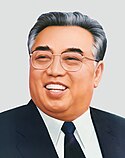Portal:North Korea/Selected biography
| This page is currently inactive and is retained for historical reference. Either the page is no longer relevant or consensus on its purpose has become unclear. To revive discussion, seek broader input via a forum such as the village pump. |
Selected biography 1
Portal:North Korea/Selected biography/1
Kim Jong-il (김정일; 16 February 1941 – 17 December 2011), was the supreme leader of North Korea from 1994 to 2011. He succeeded his father and founder of the country Kim Il-sung following the latter's death in 1994. Kim Jong-il was the general secretary of the Workers' Party of Korea, chairman of the National Defence Commission of North Korea, and the supreme commander of the Korean People's Army, the fourth-largest standing army in the world. (Full article...)Selected biography 2
Portal:North Korea/Selected biography/2
Kim Pyong-il (김평일; born 10 August 1954), is the younger paternal half-brother of the former leader of North Korea, Kim Jong-il, and the son of former leader Kim Il-sung. He is the current ambassador of North Korea to the Czech Republic. (Full article...)Selected biography 3
Portal:North Korea/Selected biography/3
Kim Jong-un (김정은; born 8 January 1983) is the supreme leader of the North Korea. He is the son of Kim Jong-il (1941–2011) and the grandson of Kim Il-sung (1912–1994). He has held the titles of the First Secretary of the Workers' Party of Korea, the Chairman of the Central Military Commission, First Chairman of the National Defence Commission of North Korea, the Supreme Commander of the Korean People's Army, and presidium member of the Politburo of the Workers' Party of Korea. (Full article...)Selected biography 4
Portal:North Korea/Selected biography/4

Regarded as one of the most important fiction writers in North Korean history, Han also ran the entire North Korean literary scene as the head of the Korean Writers' Union and minister of education. During his career, Han survived a number of purges that were caused by factional strife within the Workers' Party. Sometimes acting as the force behind the purges within the cultural establishment, Han was also motivated by personal grievances against his rival writers. Han offered some of the earliest known contributions to the cult of personality of Kim Il-sung.
Han himself was purged in 1962. His influence is felt in North Korea even today, though his name has been forgotten from official histories. Han's best known work, the anti-American Jackals, however has been invoked in the 2000s. (Full article...)
Selected biography 5
Portal:North Korea/Selected biography/5 Jo Ki-chon (조기천; 6 November 1913 – 31 July 1951) was a Russian-born North Korean poet. He is regarded as "a founding father of North Korean poetry" whose distinct Soviet-influenced style of lyrical epic poetry became an important feature of North Korean literature. He was nicknamed "Korea's Mayakovsky" after the writer whose works had had an influence on him and which implied his breaking from literature of the old society and his commitment to communist values. After a remark made by Kim Jong-il on his 2001 visit to Russia, North Korean media has referred to Jo as the "Pushkin of Korea".
Jo was dispatched by the Soviet authorities to liberated Korea when the Red Army entered in 1945. By that time, he had much experience of Soviet literature and literature administration. The Soviets hoped that Jo would shape the cultural institutions of the new state based on the Soviet model. For the Soviets, the move was successful and Jo did not only that but also significantly developed socialist realism as it would become the driving force of North Korean literature and arts.
Jo offered some of the earliest contributions to Kim Il-sung's cult of personality. His most famous work is Mt. Paketu (1947), a lyrical epic praising Kim Il-sung's guerrilla activities and promoting him as a suitable leader for the new North Korean state. (Full article...)
Selected biography 6
Portal:North Korea/Selected biography/6
Kim Il-sung (김일성; 15 April 1912 – 8 July 1994) was the supreme leader of North Korea, for 46 years, from its establishment in 1948 until his death in 1994. He held the posts of prime minister from 1948 to 1972 and president from 1972 to 1994. He was also the leader of the Workers' Party of Korea from 1949 to 1994 (titled as chairman from 1949 to 1966 and as general secretary after 1966). Coming to power after the overthrow of Japanese rule in 1945, he authorized the invasion of South Korea in 1950, triggering a defense of South Korea by the United Nations led by the United States. A cease-fire in the Korean War was signed on 27 July 1953.Under his leadership, North Korea became a socialist state and had close political and economic relations with the Soviet Union which gave the country many similarities in those respects. By the 1960s and 1970s, North Korea enjoyed a relatively high standard of living, outperforming the South which was crippled by political instability and economic crises. (Full article...)




